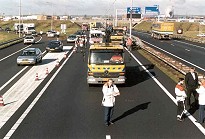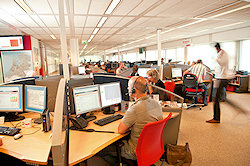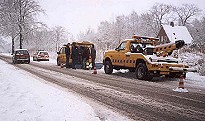Incident Management
 The objective of Incident Management is to ensure that as quickly as possible following an incident, the trunk roads are once again clear for unhindered passage of traffic. The Stichting Incident Management Nederland (Incident Management Netherlands Foundation) was established to support road managers in their efforts in the field of incident management.
The objective of Incident Management is to ensure that as quickly as possible following an incident, the trunk roads are once again clear for unhindered passage of traffic. The Stichting Incident Management Nederland (Incident Management Netherlands Foundation) was established to support road managers in their efforts in the field of incident management.
The speed with which action has to be undertaken calls for a system according to which the notification of an incident immediately results in the calling out of a qualified recovery company. A precondition for guaranteeing this immediate response is participation by all emergency assistance centres in the Stichting Incident Management Nederland.
Incident management: cooperation between all emergency assistance centres
 Because all emergency assistance centres cooperate within the Stichting Incident Management Nederland, on the trunk road network, they all make use of the same recovery companies. In practical terms this means that whenever an incident occurs on a trunk road, it is not necessary to investigate with which insurance company the vehicles involved are insured; instead, the recovery company responsible for the district in question can simply be immediately deployed. After all, the recovery company is a contract partner to all emergency assistance centres in that district and via them to all insurance companies.
Because all emergency assistance centres cooperate within the Stichting Incident Management Nederland, on the trunk road network, they all make use of the same recovery companies. In practical terms this means that whenever an incident occurs on a trunk road, it is not necessary to investigate with which insurance company the vehicles involved are insured; instead, the recovery company responsible for the district in question can simply be immediately deployed. After all, the recovery company is a contract partner to all emergency assistance centres in that district and via them to all insurance companies.
The cooperation between emergency assistance centres in establishing contracts with the recovery companies offers the additional advantage that in incidents involving multiple road vehicles, only one recovery company is called in. This fact facilitates the coordination for dealing with the incident.
Agreements for rapid response
The cooperation between Stichting Incident Management Nederland and the road managers in fact goes beyond simply contracting recovery companies. A series of working agreements have been drawn up aimed at ensuring that incidents are dealt with as quickly as possible. The following agreements are in place:
- The National Central Reporting Point (LCM) immediately contacts a recovery company following receipt of an incident report, even if it is not certain that recovery services will still be required;
- In all cases, the LCM calls in a recovery company, even if there is a risk that the vehicles involved in the incident are uninsured.
Free competition between recovery companies
The cooperation between emergency assistance centres within the Stichting Incident Management Nederland in establishing contracts with recovery companies must never result in a restriction of free competition between recovery companies. For that reason, the activities of the Stichting Incident Management are bound by a number of conditions:
- the contracts with the Stichting Incident Management relate exclusively to emergency recovery work, in other words not breakdown assistance and/or the further transport of recovered vehicles;
- the contracts with the Stichting Incident Management apply exclusively on roads on which the responsible road manager operates an active incident management policy (so-called IM roads);
- the contracts with the Stichting Incident Management must be awarded on the basis of an open tender procedure;
- the contracts with the Stichting Incident Management must apply for a limited period.
These conditions were adopted by the Stichting Incident Management on the basis of consultation with the Netherlands Competition Authority ("NMa"). The NMa is the government body responsible for supervising enforcement of Competition Law.
Incidents on the underlying road network
 Approximately 80% of all incidents requiring the assistance of a recovery company take place on the underlying road network. On these roads, the emergency assistance centres each work with their own network of recovery companies. Any intervention by the LCM on these roads is the result of a request from the Dutch Police forces. The Police has expressed the need for a single telephone number for the notification of all incidents, irrespective of the precise location at which they take place (IM road or otherwise).
Approximately 80% of all incidents requiring the assistance of a recovery company take place on the underlying road network. On these roads, the emergency assistance centres each work with their own network of recovery companies. Any intervention by the LCM on these roads is the result of a request from the Dutch Police forces. The Police has expressed the need for a single telephone number for the notification of all incidents, irrespective of the precise location at which they take place (IM road or otherwise).
Because the Police plays an important role in monitoring the clearing up of incidents, the Stichting Incident Management Nederland recognises the importance of fulfilling this wish. Whenever the Police reports an incident on the underlying road network, the LCM will be responsible for calling in the relevant recovery company. On these roads, the LCM first asks the Police for the registration of all vehicles involved. Using that information, the LCM can identify the responsible insurance company. By means of a detailed map, the region in which the incident has occurred can be identified. The LCM then uses its extensive database to identify the responsible emergency assistance centre, and the recovery company with which the assistance centre has a contract at the relevant location. That recovery company is then called in by the LCM, at which point the entire file is passed on to the emergency assistance centre. The LCM then ensures that the report is forwarded to the recovery company.
Because the activities of the LCM on the underlying road network are purely operational, this across-the-board deployment of the LCM has no consequences in terms of competition law.
Incident Management Links
Incident Management Ministry of Transport, Public Works and Water Management